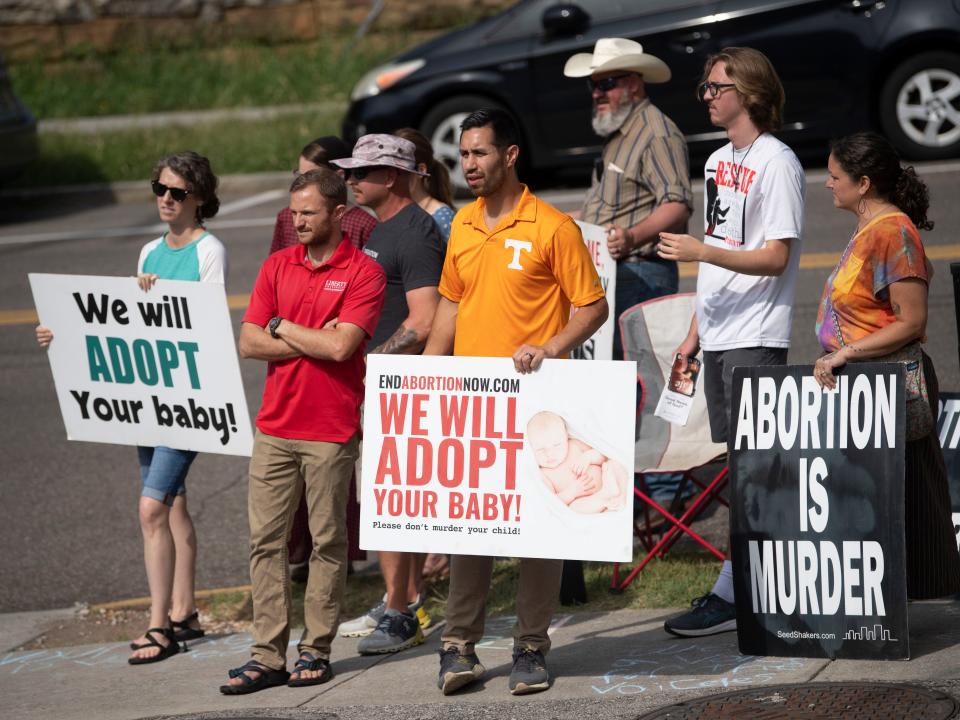Outrage about overturning Roe v. Wade is antithetical to American democracy | Column
The oppositional roar across business, politics, and media hasn’t relented from the moment the Supreme Court overturned Roe v. Wade.
The decision is a watershed moment in America’s legal landscape, but detractors of the Supreme Court’s opinion continue to dance around the issue of who is best situated to articulate abortion policy. We should demand an answer.
The most common response I’ve encountered is that abortion is a medical decision between a woman and a healthcare provider. In more specific terms, the right to abortion is absolute until birth.
The moment any kind of law or regulation impacts that decision, someone other than a woman and her doctor is party to the decision. Even the most permissive states have laws regarding abortion. California, for example, prohibits post-viability abortions unless continuing a pregnancy endangers the life or health of a pregnant person.
The outcry about California’s abortion restrictions from those opposing the Court’s decision Dobbs v. Jackson Women’s Health Organization is nonexistent. Most Americans, even those who ardently support abortion rights, don’t abide on-demand abortion at any time during pregnancy for any reason. Such a view, at best, represents roughly a third of the country according to Gallup’s polling on the issue.
Hear more Tennessee Voices: Get the weekly opinion newsletter for insightful and thought provoking columns.
What the Constitution says about abortion
Abortion advocates relished the legal environment created under Roe and Planned Parenthood v. Casey. In states where abortion rights were more popular, legislatures could create more expansive legal avenues to terminate pregnancies.
In states where majorities opposed abortion access, the Court crafted a constitutional bar preventing them from restricting abortion prior to the point of fetal viability.
The vast majority of the country supports some government-imposed limitations on abortion. Only a few options exist to determine what those limitations will be: the Constitution, the Supreme Court, the federal government, or the states.
The Constitution does not protect abortion access on its face. We can reasonably debate and vote upon constitutional amendments securing the right to abortion, the right to privacy, the right to healthcare, and a great number of other potential rights. America is not without a process to elevate a policy preference to the highest law of the land.
But the threshold for such amendments is high and should be. The Constitution sets boundaries for what our state and federal governments may legally impose upon us as Americans. We should expect broad consensus to change it.

Sign up for Latino Tennessee Voices newsletter: Read compelling stories for and with the Latino community in Tennessee.

Your state. Your stories. Support more reporting like this.
A subscription gives you unlimited access to stories across Tennessee that make a difference in your life and the lives of those around you. Click here to become a subscriber.
Why the high court felt Roe and Casey were flawed
In Roe, the Court stretched the text of the Constitution to determine that the Due Process Clause of the Fourteenth Amendment provides a fundamental "right to privacy” wherein resides the right to an abortion. Roe’s tortured reasoning stood for decades on little more than the Court’s good graces.

The Court in Dobbs clearly reached a different conclusion:
"Roe and Casey each struck a particular balance between the interests of a woman who wants an abortion and the interests of what they termed “potential life.” But the people of the various States may evaluate those interests differently ... Our Nation’s historical understanding of ordered liberty does not prevent the people’s elected representatives from deciding how abortion should be regulated."
If abortion advocates believe that the Supreme Court should decide whether abortion is a constitutional right, then they are subject to the changing makeup of the Court. That is precisely what happened in Dobbs.
The outrage over the Dobbs opinion is antithetical to America’s representative democracy. Abortion advocates demand representation in ideologically aligned states while prescribing a heavy-handed Supreme Court for the rest.
Sign up for Black Tennessee Voices newsletter: Read compelling columns by Black writers from across Tennessee.
It's up to voting citizens to decide the future of abortion rights
Amending the Constitution is a hill too challenging for abortion advocates to climb. Hoping for the Supreme Court to “rediscover” a constitutional right to abortion again seems unlikely any time soon. That essentially leaves either the federal government or state governments to quickly address abortion.

Democrats hope to codify Roe in Congress, but such a law would face a dim fate before a Supreme Court with a restrictive view of congressional authority over the issue. They’re also running out of time. Serious electoral headwinds jeopardize slim Democratic majorities in November.
That essentially leaves the states as the seat of abortion policy. Elected representatives will weigh the arguments and equities to reach conclusions reflecting the will of their constituents. We should passionately voice our preferences and opinions. It’s what we do on every other controversial issue. The Supreme Court has simply leveled the policy arena.
We’ll quickly discover whether we the people support those new laws. If not, we have a right powerful enough to impact the Constitution, the Supreme Court, and legislatures across America: The right to vote.
USA TODAY Network Tennessee Columnist Cameron Smith is a Memphis-born, Brentwood-raised recovering political attorney raising three boys in Nolensville, Tennessee, with his particularly patient wife, Justine. Direct outrage or agreement to smith.david.cameron@gmail.com or @DCameronSmith on Twitter. Agree or disagree? Send a letter to the editor to letters@tennessean.com.
This article originally appeared on Nashville Tennessean: Roe v. Wade: Outrage over reversal is antithetical to U.S. democracy

